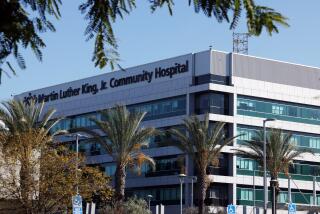‘The Teaching Hospital’
- Share via
Your editorial (Oct. 23), “The Teaching Hospital,” correctly states that teaching hospitals perform a critical public service that should not be lost to society as a result of national health cost-cutting measures now being implemented. We also concur in your concern for the disadvantaged poor patient.
Both the quality training of health-care professionals and patient services for the poor may fall between the cracks in the well-intentioned efforts of every payer, be they private insurance or government, to pay for no more than precisely the needs of the patient for which they feel contractually responsible.
This is a problem that needs to be solved by society as a whole. However, the “model” you support to solve the problem--a tax on all providers of health service to create a fund to cover the costs of health education and the under-insured patient--has one very serious flaw:
It would be in reality a tax upon the sick; those who already have the burden of paying for their own illness, even if it is through insurance, would have to pay more in order to cover the cost of hospital education and uncompensated care. That is the old system; that is the cross-subsidization system that government and business are rebeling against right now by the implementation of cost-cutting competition between health-care providers.
A solution that inserts a hidden tax on providers (or, more precisely, the patients) directly and inappropriately inflates the cost of health care to every paying patient, and grossly distorts the true cost of care for the average patient.
We believe that the cost-efficiency benefit of competition should be allowed to continue, but that the cost of educating health-care professionals (as with any other profession) be treated as an educational expense rather than a health-care cost.
Both the educational cost and the cost of care for the disadvantaged poor are a responsibility of society as a whole. As you said, “Since the benefits are shared by all, so should the cost.”
STEPHEN W. GAMBLE
Los Angeles
Gamble is president of the Hospital Council of Southern California.
More to Read
Inside the business of entertainment
The Wide Shot brings you news, analysis and insights on everything from streaming wars to production — and what it all means for the future.
You may occasionally receive promotional content from the Los Angeles Times.








